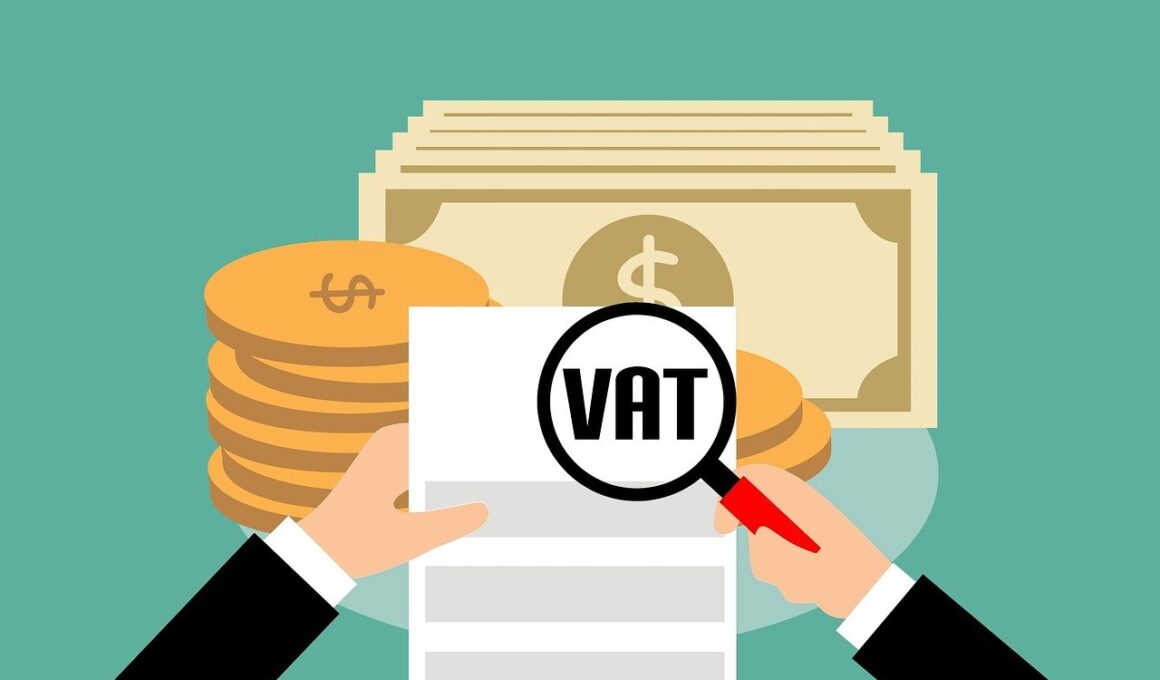International Perspectives on VAT Systems
Value Added Tax (VAT) serves as a critical fiscal tool employed by numerous countries globally. Implementing VAT systems can enhance government revenues significantly, yet the methods and structures can vary widely. Various nations adopt distinct rates, exemptions, and compliance requirements, influencing how businesses and consumers interact with this system. In Europe, VAT is a standard practice, with many EU member states implementing a harmonized approach. This alignment fosters easier cross-border trade, which benefits both businesses and consumers. Each country, however, retains the autonomy to establish specific VAT rates catering to domestic needs. For instance, the standard VAT rate in Germany is 19%, while in France, it stands at 20%. Differences in VAT rates affect pricing structures and competitive advantages. In comparison, countries in the developing world might utilize VAT differently, focusing on broadening the tax base while minimizing exemptions. Understanding the diverse VAT practices globally allows policymakers to devise better tax structures and objectives. Studying various VAT regulations helps to improve compliance and efficiency, ultimately maximizing government income. This aspect of fiscal policy plays a critical role in economic stability and growth across nations of varying development stages.
Countries experience unique challenges in their VAT systems based on their economic environments. Tax compliance and collection can often be contentious, with businesses frequently navigating complex regulations that differ significantly from one jurisdiction to another. Furthermore, the informal economy may interfere with effective VAT collection. In many developing nations, businesses may operate outside formal frameworks, managing to evade VAT obligations and undermining broader economic goals. To mitigate such issues, some governments have adopted technology-driven solutions like electronic invoicing and real-time data reporting. These innovations can enhance tax compliance and streamline administration, ultimately improving revenue collection. In contrast, the developed nations often face concerns related to ensuring fair competition amongst businesses subject to VAT and those that are not. These discrepancies can lead to market distortions impacting the overall economy. For example, harmonizing VAT rates across sectors can address these disparities, promoting a level playing field. Implementing effective policies addressing these issues can improve indirect tax revenue substantially. Tax authorities worldwide continuously strive to balance compliance costs while fostering an environment conducive to economic growth, reflecting the multifaceted nature of VAT systems in different countries.
Impact of VAT on Businesses
The impact of Value Added Tax (VAT) on businesses is profound and multifaceted. VAT’s unique structure means businesses must be vigilant about compliance, as it is ultimately consumers who pay the tax embedded in the prices they charge. This can place significant administrative burdens on small and medium-sized enterprises (SMEs) that may lack resources for robust financial operations. SMEs often find it exceedingly challenging to manage VAT compliance efficiently due to the complexities involved in calculating VAT payable and filing returns accurately. Consequently, many opt to outsource these tasks to specialized firms, adding to operational costs. Despite the challenges, some businesses view VAT as a necessary expense leading to increased legitimacy in the market. A well-structured VAT system can enhance consumer trust as it positions firms more responsibly regarding tax obligations. Moreover, businesses that can pass on VAT costs to customers may retain their profitability. Ultimately, effective management of VAT systems is crucial for operational success, influencing pricing decisions and overall competitiveness in local markets. As firms adapt to evolving VAT landscapes, their responsiveness reflects their strategic orientation toward growth and compliance in a globalized economy.
VAT rates can have significant implications for consumer behavior and spending patterns. Elevated VAT rates might deter spending, especially for discretionary items. Conversely, lower rates can encourage consumption, impacting economic dynamics within a country. Policymakers often introduce varying VAT rates based on product categories to stimulate certain sectors of the economy. For instance, many nations apply a reduced VAT rate for essential goods, like food and medications, to alleviate the burden on low-income consumers. A balanced approach to VAT structuring can contribute to a more equitable tax system, though it necessitates careful planning to avoid creating distortions in the market. Furthermore, behavioral economics underlines the importance of consumer perception in response to VAT changes; minor adjustments can dramatically influence purchasing behaviors. Understanding these dynamics is key for businesses aiming to adapt their strategies in line with tax policies. Tracking these shifts in consumption behaviors promotes smarter decision-making regarding pricing, marketing, and inventory management. By observing changes in purchasing patterns in response to VAT adjustments, both businesses and policymakers can work towards more sustainable economic growth.
Global Trends in VAT Adoption
Globally, the adoption of VAT systems continues to evolve, reflecting changing economic landscapes and regulatory environments. As nations seek diversified revenue streams, VAT remains a preferred choice due to its efficiency in revenue generation. Recent trends indicate an increased alignment among countries regarding VAT practices, aiming for broader harmonization. The OECD conducts assessments and assists countries in reforming their VAT frameworks to ensure compliance and efficiency. Emerging economies are noticing a rising trend in VAT adoption, reflecting their upper-class growth along with increased urbanization, necessitating a sustainable approach to taxation. Additionally, many countries shift towards digital transformations in tax administration, implementing automation for improved collection and compliance efforts. Digital platforms facilitate transparency and reduce opportunities for tax evasion, a critical benefit for many modern economies. Countries such as India and South Africa have made notable strides in evolving their VAT frameworks to accommodate digital transactions and enhance revenue collection strategies. Emphasizing the importance of periodic VAT audits can further bolster adherence, ensuring equitable tax structures across demographics. These global shifts present both challenges and opportunities for fiscal policymakers as they navigate this crucial economic instrument.
Another aspect of VAT systems involves international trade and cross-border commerce. VAT impacts how imported goods are taxed relative to domestically produced items, affecting competitiveness across markets. In many jurisdictions, importing goods incurs VAT charges, which businesses must navigate effectively. Different treatment of goods based on origin creates compliance complexities that businesses must manage continuously for smooth operations. This is particularly true within the European Union, where VAT rules permit goods to circulate across member states without incurring border VAT charges. This system facilitates trade between EU countries, offering a competitive advantage to domestic producers. However, similar agreements may not exist in other regions, creating barriers for non-EU entities aiming to compete. Governments frequently negotiate VAT treaties to address discrepancies across countries and promote fair trade practices globally. This negotiating dynamic results from an increasing recognition that standardizing VAT policies can reduce compliance burdens and foster economic cooperation. The intricacies of VAT and international commerce necessitate ongoing dialogue among trade partners, ensuring that tax regulations evolve alongside the global marketplace.
The Future of VAT Systems
The future of VAT systems worldwide is characterized by ongoing transformation, driven primarily by technological advancement and economic shifts. As digital economies gain prominence, VAT frameworks are increasingly tasked with addressing unique challenges these environments present. Platforms facilitating electronic commerce are frequently disrupted by cross-border sales that complicate existing VAT collection systems, necessitating reform. Reforms focused on enhancing global compliance are becoming essential as authorities recognize the need to adapt legislation to digital realities, including implementing measures for ensuring proper taxation of digital goods and services. Additionally, fostering cooperation among international tax authorities creates a more equitable environment for businesses, ensuring that VAT regulation keeps pace with quickening digitalization. Moreover, businesses must accumulate data analytics capabilities to maintain compliance in this continually switching fiscal landscape. Studying interactions between VAT systems and emerging technologies, like cryptocurrency, will undoubtedly play a crucial role in future frameworks. Variable VAT rates on digital assets may also dictate how companies structure pricing. In conclusion, understanding these trends can empower policymakers and industry leaders to innovate and sustain viable VAT systems in changing economies.
In the pursuit of efficient VAT systems, ongoing training and education for tax professionals worldwide remains paramount. As industries evolve, so do the skills required to navigate complex tax landscapes. Continuous professional development is crucial for ensuring compliance and advising businesses on adapting to emerging regulatory challenges successfully. Engaging tax professionals enables businesses and governments to remain agile in a competitive global economy. Workshops and training initiatives focusing on VAT compliance, implications, and administration contribute to heightened awareness of evolving best practices. Furthermore, leveraging online resources and tools for education helps professionals stay informed about changes in legislation and taxation strategies. As VAT policies require continuous adaptation, so too must the capabilities of tax professionals, emphasizing the importance of investment in human capital. Collaborating with educational institutions may enhance knowledge-sharing opportunities that foster stronger VAT-related skill sets. Effective training delivers tangible benefits for businesses aiming for competitive advantages, ensuring that they efficiently comply with obligations. Going forward, enhancing education in VAT and continuously adapting skill development in this arena reflects shared responsibilities between governments and industries, paving the way for robust economic activity globally.


